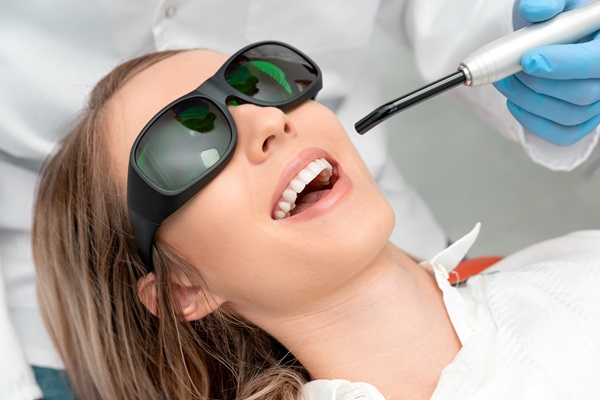How Does a Dentist Use Laser Dentistry for Dental Cleaning?

Laser dentistry is a relatively young concept that can target diseased soft tissue and improve the health of gums, jawbone, and more. Dental lasers are approved by the Food and Drug Administration (FDA), and the risks of the procedure are minimal. Subsequently, dentists often recommend laser dentistry for deep dental cleaning procedures.
Laser dentistry and dental cleaning
A routine dental cleaning removes plaque and tartar build-up along the gum line and on the surface of teeth. A deep dental cleaning actually cleans below the gum line. Traditional methods of deep dental cleaning can cause discomfort, and laser dentistry offers a way to minimize the pain and recovery time for a deep dental cleaning procedure.
What is laser dentistry?
Laser dentistry is an alternative method of dental treatment that uses highly focused light energy beams to remove or reshape tissue, bone, and more. Laser dentistry is a safe and effective alternative for patients that do not like the sound and feel of dental drills and other instruments.
How is laser dentistry used for dental cleaning?
As mentioned, laser dentistry is used for deep dental cleaning more than it is used for regular dental cleanings. During the procedure, the dentist uses dental lasers to target and remove plaque and tartar build-up along and beneath the gum line. This is done without harming any healthy gum tissue and without causing the gums to separate from the teeth.
Laser dentistry vs. traditional methods
Laser dentistry for dental cleanings does not require the use of any dental tools other than the FDA-approved dental lasers. This means there is no need for the more invasive dental tools often used with traditional methods, such as dental drills. This procedure also does not cause much, if any, discomfort, whereas traditional methods are much more likely to cause swelling, pain, and bleeding.
Is laser dentistry safe?
As mentioned, the use of laser dentistry for dental cleanings is approved by the FDA. Dentists also go through extensive training to help ensure the optimal safety and effectiveness of the procedure. Subsequently, the risks of deep dental cleaning with laser dentistry are minor, and most patients do not experience any adverse effects. In fact, the opposite is often true. Many patients report less discomfort and faster healing times with laser dentistry.
How to keep teeth and gums clean after your cleaning
Patients can protect their teeth and gums by brushing and flossing regularly after a dental cleaning. Regular visits to the dentist for routine cleaning are also highly encouraged, along with making smart dietary choices, such as avoiding foods and drinks that are high in sugar and other carbohydrates.
Schedule a visit for a laser dentistry dental cleaning
If you still have questions about laser dentistry or would like to schedule a visit for a dental cleaning either with lasers or through traditional methods, then reach out to our dental practice today. We are glad to answer your questions and help you decide on the best treatment option for you.
Request an appointment here: https://www.dentalgroupofsimivalley.com or call Dental Group of Simi Valley at (805) 926-7464 for an appointment in our Simi Valley office.
Check out what others are saying about our dental services on Yelp: Laser Dentistry in Simi Valley, CA.
Related Posts
All-on-4 implant treatment has become a transformative option for individuals seeking full-arch restoration, and understanding several important factors before choosing all-on-4 is essential.Before patients undergo all-on-implant placement, their dental provider will need to determine if they are ideal candidates. Factors that contribute to this include: Sufficient bone density Good overall oral health Healthy gum tissue…
A root canal restores a damaged or infected tooth without removing it, and recovery usually proceeds smoothly with the right care. Mild tenderness is common as the tissues calm down, especially when chewing or when the tooth is touched. Good oral hygiene, smart food choices, and timely follow-up help the tooth feel normal again. Because…
A smile makeover is a comprehensive approach to enhancing the appearance of the teeth through customized cosmetic treatments. After completing a smile makeover, patients often enjoy renewed confidence, improved oral function, and a more attractive smile. To maintain these results and protect the investment, it is essential to follow proper care routines and dental guidance.Good…
A dental implant restoration is a significant investment in your oral health. This tooth replacement option offers durability while improving the function and appearance of your smile. However, there are ways how you can ensure the long-term success and integrity of the restoration.Keeping good oral hygiene is important for the longevity of a dental implant…
